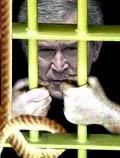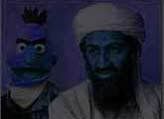| Find |
Sunday, 25 February 2007
US funds terror groups to sow chaos in Iran
America is secretly funding militant ethnic separatist groups in Iran in an attempt to pile pressure on the Islamic regime to give up its nuclear programme.
In a move that reflects Washington's growing concern with the failure of diplomatic initiatives, CIA officials are understood to be helping opposition militias among the numerous ethnic minority groups clustered in Iran's border regions.
The operations are controversial because they involve dealing with movements that resort to terrorist methods in pursuit of their grievances against the Iranian regime.
In the past year there has been a wave of unrest in ethnic minority border areas of Iran, with bombing and assassination campaigns against soldiers and government officials.
Such incidents have been carried out by the Kurds in the west, the Azeris in the north-west, the Ahwazi Arabs in the south-west, and the Baluchis in the south-east. Non-Persians make up nearly 40 per cent of Iran's 69 million population, with around 16 million Azeris, seven million Kurds, five million Ahwazis and one million Baluchis. Most Baluchis live over the border in Pakistan.
Funding for their separatist causes comes directly from the CIA's classified budget but is now "no great secret", according to one former high-ranking CIA official in Washington who spoke anonymously to The Sunday Telegraph.
His claims were backed by Fred Burton, a former US state department counter-terrorism agent, who said: "The latest attacks inside Iran fall in line with US efforts to supply and train Iran's ethnic minorities to destabilise the Iranian regime."
Although Washington officially denies involvement in such activity, Teheran has long claimed to detect the hand of both America and Britain in attacks by guerrilla groups on its internal security forces. Last Monday, Iran publicly hanged a man, Nasrollah Shanbe Zehi, for his involvement in a bomb attack that killed 11 Revolutionary Guards in the city of Zahedan in Sistan-Baluchistan. An unnamed local official told the semi-official Fars news agency that weapons used in the attack were British and US-made.
Yesterday, Iranian forces also claimed to have killed 17 rebels described as "mercenary elements" in clashes near the Turkish border, which is a stronghold of the Pejak, a Kurdish militant party linked to Turkey's outlawed PKK Kurdistan Workers' Party.
John Pike, the head of the influential Global Security think tank in Washington, said: "The activities of the ethnic groups have hotted up over the last two years and it would be a scandal if that was not at least in part the result of CIA activity."
Such a policy is fraught with risk, however. Many of the groups share little common cause with Washington other than their opposition to President Mahmoud Ahmadinejad, whose regime they accuse of stepping up repression of minority rights and culture.
The Baluchistan-based Brigade of God group, which last year kidnapped and killed eight Iranian soldiers, is a volatile Sunni organisation that many fear could easily turn against Washington after taking its money.
A row has also broken out in Washington over whether to "unleash" the military wing of the Mujahedeen-e Khalq (MEK), an Iraq-based Iranian opposition group with a long and bloody history of armed opposition to the Iranian regime.
The group is currently listed by the US state department as terrorist organisation, but Mr Pike said: "A faction in the Defence Department wants to unleash them. They could never overthrow the current Iranian regime but they might cause a lot of damage."
At present, none of the opposition groups are much more than irritants to Teheran, but US analysts believe that they could become emboldened if the regime was attacked by America or Israel. Such a prospect began to look more likely last week, as the UN Security Council deadline passed for Iran to stop its uranium enrichment programme, and a second American aircraft carrier joined the build up of US naval power off Iran's southern coastal waters.
The US has also moved six heavy bombers from a British base on the Pacific island of Diego Garcia to the Al Udeid Air Base in Qatar, which could allow them to carry out strikes on Iran without seeking permission from Downing Street.
While Tony Blair reiterated last week that Britain still wanted a diplomatic solution to the crisis, US Vice-President Dick Cheney yesterday insisted that military force was a real possibility.
"It would be a serious mistake if a nation like Iran were to become a nuclear power," Mr Cheney warned during a visit to Australia. "All options are still on the table."
The five permanent members of the UN Security Council plus Germany will meet in London tomorrow to discuss further punitive measures against Iran. Sanctions barring the transfer of nuclear technology and know-how were imposed in December. Additional penalties might include a travel ban on senior Iranian officials and restrictions on non-nuclear business. Link
Posted at
10:45
![]()
![[Zionazis-1.jpg]](https://blogger.googleusercontent.com/img/b/R29vZ2xl/AVvXsEg_x8DOGucgHQmfJJujuK_oYJdxhEnskhQqt-Og7lSk52HeaDQYzW8NQWfdpHmPgj_FJN0jJ3tz1prR1jVZHdHky2HDQxxcs4LVxX0DtAt3fG0sfRr6MDx7Sz8cJNjl0k0RS9TbCjangQ/s1600/Zionazis-1.jpg)




